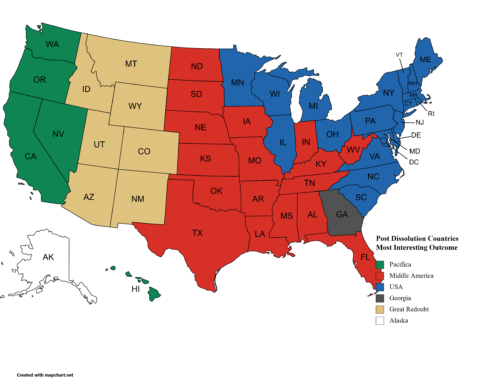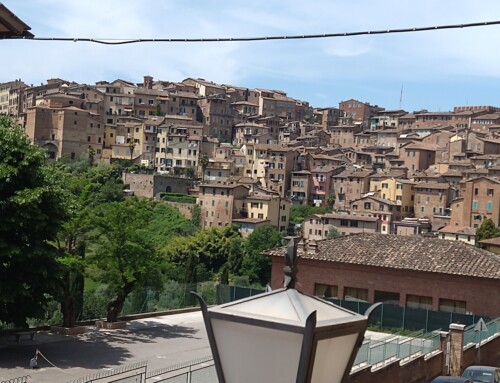Last week I had a very serendipitous convergence. I had fresh in my memory the day two weeks ago that I spoke to the government classes at our local high school. It’s not the kids’ fault that they didn’t know what the social contract is. The overwhelming sentiment among these seniors was that we should drastically cut or eliminate the government and that everyone ought to take care of themselves. So when I discussed the importance of people not having to expend all their energy defending themselves from sudden attack, from all the efficiencies that come from government-funded roads, police, schools, etc. they suddenly started questioning what else they might not understand. Then I finished Rinker Buck’s truly outstanding book The Oregon Trail and I enjoyed a great day at New America‘s annual conference in DC the same week. So what does all this have to do with anything? It has to do with how to revitalize our country and keep us from a negative slide towards stagnation at best and catastrophe at worst.
In the afterword of his novel, Empire, Orson Scott Card wrote a socio-political commentary that could easily have been mistaken for a think-tank piece from D.C.: “We are fully polarized–if you accept one idea that sounds like it belongs to either side of the blue or the red, you are assumed–nay, required–to espouse the entire rest of the package, even though there is no reason why supporting war against terrorism should imply you’re in favor of banning all abortions and against restricting the availability of firearms; no reason why being in favor of keeping government-imposed limits on the free market should imply you are also in favor of giving legal status to homosexual coupes and against building nuclear reactors. These issues are not remotely related, and yet if you hold any of one group’s views, but not all, you are treated as if you were a traitor for deviating even slightly from the party line…We are today a nation where almost everyone in the public eye displays fanaticism with every utterance…Somehow, we’ve managed to divide ourselves into two different, mutually exclusive sanities. The people in each society reinforce each other in madness, believing unsubstantiated ideas that are often contradicted not only by each other but also whatever objective evidence exists.”
Wow. This is exactly what I’ve heard from so many people over the last few years. But then comes the hard part of asking what to do in the face of this truth. Enter New America, who says of themselves: “By building a network and a narrative of national renewal, New America plans to tell a story, backed by evidence, of a country where government works with the people to create solutions for the people, to challenge national pessimism and rage into actual change.”
New America’s theme for this year’s conference was a new social contract for America. Great topic. New America was founded on the premise that there is a “radical center” in the US where ideas are unencumbered by preconceived political party positions. This is a philosophical position I’ve maintained for some time. It echoes what Scott Card wrote at the end of Empire. Yes, the conference had good speakers with good messages and some genuine concerns about the economy and the plight of the worker in today’s society. But the best conversations, as always, are the ones during breaks with people you’ve just met and where ideas are connected and explored among participants. As James Fallows of the Atlantic (and a New America board member) has written over the last three years, the renewal in America is happening outside of DC and the state capitals in cities and small communities where they’re setting aside politically-constraining boxes and their red-blue, left-right differences to genuinely solve problems and lift everyone up. And that comes by raising social capital (Robert Putnam, anyone???).
So what do Scott Card’s 2007 socio-political commentary and New America have to do with Rinker Buck and The Oregon Trail? Well, Buck captivates and educates with his memoir of the first unassisted crossing of The Oregon Trail in over a century; a 2,100 mile struggle that Rinker made with his brother, Nick, a reconstructed Schuttler wagon and a three-mule team. Unlike the thousands of wagons in long trains that crossed during the Great Migration, the Buck brothers did it alone. But even then, they didn’t. In the 1800s, large trains pooled the efforts of men, women, children and animals to unload carts, lower them down steep ridges, cross rivers and do the things that individuals couldn’t do.
The fictional narrative of the Rugged Individual who conquered nature and settle the west is harshly treated by Buck, who shows how necessary community and the social contract were. The government gave away land to settlers, sent the Army to protect the route and build new trails. People helped each other and moved on after failures, rather than staying in one place. And in their 2011 crossing, though had went without support trucks and RVs and meal support, they found in nearly every town along the trail, public corrals, parks and amenities built on the very camp sites of the pioneers. And in each of these places, strangers became friends when they offered help in the form of meals, showers, workshops to rebuild brakes and axles. In the very reddest states where many argue against government and taxation, their local and state taxes pay for outstanding local parks, corrals and public restrooms.
So the social contract is still alive and seemingly strongest in the very places where the contemporary political writers probably wouldn’t expect, small towns in Western states. What can we learn from this? As Scott Card, Rinker Buck and New America have said, we need to look across these artificially-created divides and seek relationships with our neighbors and even strangers. When we cease expending energy staying awake to protect ourselves from attack from any neighbor, we have time to use our ingenuity to solve greater problems. We help those in need. We look for the good that come from cooperation between governments, the people, industry and non-profit sectors alike.
I’ve maintained in my writings and speaking that people most succeed in business and life when they search for ideas and practically connect them with seemingly disparate concepts and ideas. We shouldn’t be afraid of ideas unlike our own, but look for challenges. It will either make your position stronger or change your mind, as long as you’re open to truth. Social capital and a new social contract can do that for America.
Keep thinking…
Please visit www.bgcts.com for more.






Well said Tom. I have considered myself an “extreme moderate” for the past several years. Unfortunately it makes it hard on election day when you are obliged to pick the lesser of two evils. Thanks.